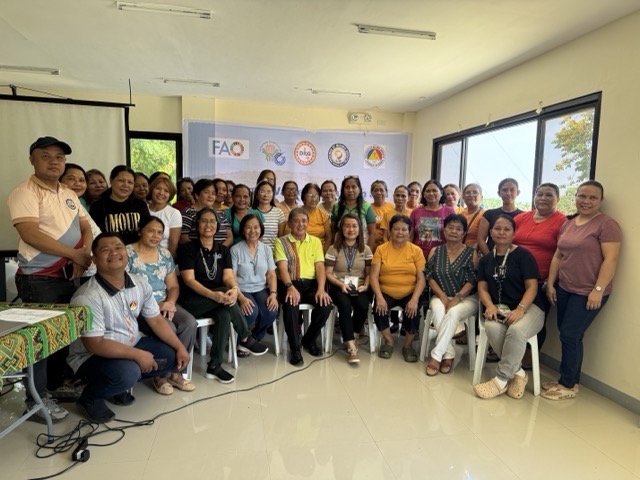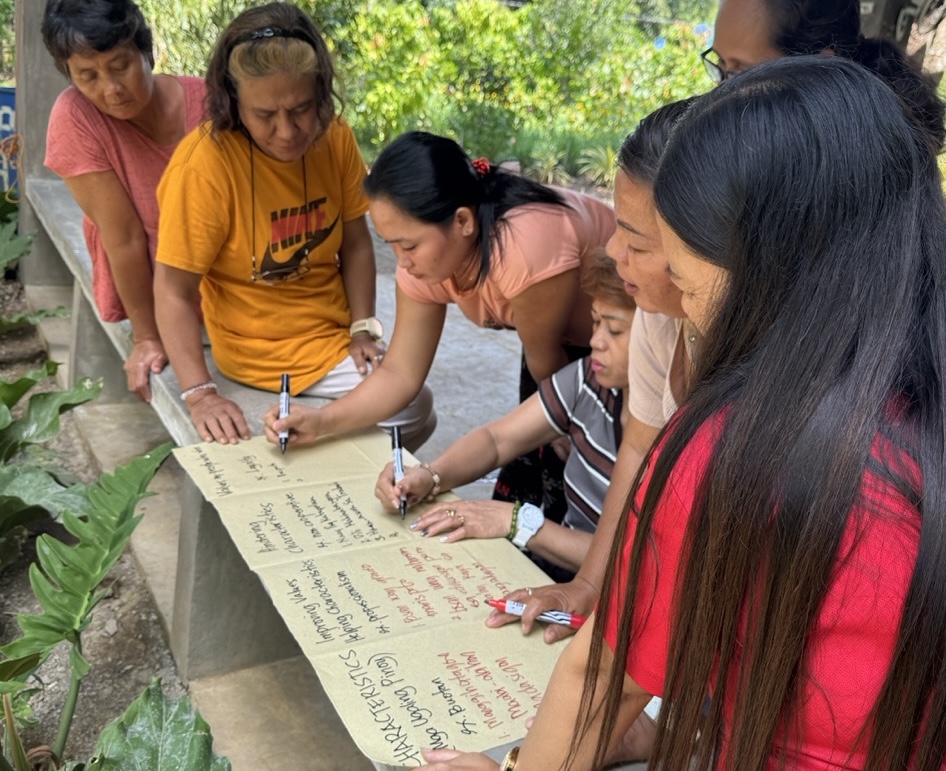FAO trained women fisherfolk on values formation with team building activities to strengthen women organizations in coastal municipalities of the Philippines

During the months of January, June, July and August of 2025, FAO in collaboration with the Bureau of Fisheries and Aquatic Resources (BFAR) Provincial Fishery Office (PFO) of Misamis Occidental conducted a series of trainings on values formation and team building for women in small-scale fisheries in the provinces of Misamis Occidental and Misamis Oriental in Northern Mindanao as a continuation of the planned and targeted trainings aimed at strengthening the women fisherfolk organizations in five villages located in three municipalities in those same provinces.
The trainings were conducted under the FAO Project FVC/GLO/225/MUL, “Implementing the Small-Scale Fisheries Guidelines for gender-equitable and climate-resilient food systems and livelihoods - Phase 2”. A total of 110 women from the Women fisherfolk associations in both provinces, 15 Local Government Unit (LGU) staff (Misamis Occidental – 7; Misamis Oriental – 8) and 17 BFAR personnel (Misamis Occidental – 11 ; Misamis Oriental – 6) participated in the event.
The trainings aimed to: (i) increase small-scale women’s understanding of the importance of having a right perspective as an individual and as a member of a group working together towards a common goal, including leadership qualities; (ii) improve their understanding of the values necessary to succeed as an individual, as a member of a team and as a woman-leader, whatever position one holds; (iii) have a better appreciation of the value of time and how to make use of every opportunity that comes; and (iv) equip them with skills in preparing action plans and simple project proposals. The training materials consisted of modules that BFAR currently uses in their values formation and team building activities to build capacities of fisherfolks.
Topics tackled during the 3-day trainings included the following: (i) “Life Begins Today”, which focused on personal growth and motivation; (ii) ”Values Enrichment and Leadership: Road to Success” that focused on understanding core values that drive success in leadership and community building, especially within the context of women in small-scale fisheries; (iii) “Respect and Inclusion”, which focused on promoting respect for diversity and inclusion regardless of status, emphasizing gender equality, and respecting individual differences to build a stronger, more cohesive group and/or community; (iv) “Bank Account of Life” which discussed topics such as financial literacy, savings, and the importance of managing personal and group finances effectively to support long-term project success; (v) “The Value of Time”, which dealt with time management skills and how to effectively allocate time for personal development, work, and community activities; and (vi) “Leadership in Action: Applying What We've Learned”, which allowed participants to reflect and think how the principles and skills obtained from the training could be put into action.
Women were given the opportunity to work in groups to share how they can apply all the values and leadership skills discussed during the training. The group discussion guiding question was, "How can we apply these leadership skills in our daily lives and within the community?" In addition, the women did role-playing exercises on leadership challenges they might face and how they can address them by absorbing the values that were taught during the trainings.

Moreover, women were provided guidance in Action Planning for Community Projects. Participants worked in small groups to develop a concrete action plan applying the principles learned from the training as well as bringing in their actual experiences and learning as a member of an association working together in small livelihood activities. The action plan included plans for sustainability and steps to improve leadership and growth for the organization. In addition, they also discussed how they will monitor and evaluate their progress. Women presented their outputs at the end of the training on Day 3. The trainers and other women participants were provided feedback that helped them improve their plans. Proof of the success of the training is that BFAR agreed to fund selected project proposals that were presented by the women, provided they meet the criteria set by BFAR.
Every women fisherfolk association pledged to continue to work as a group and made commitments to settle differences, to support each other, and to make initiatives that will strengthen the association. The LGU committed to continuing to support the association to strengthen it and to include them as beneficiaries of local government interventions. In the same manner, BFAR committed to include the association as beneficiaries of livelihood interventions if the members exhibit commitment to work as a group, which can be verified through their existing small group income-generating activities.
To learn more access:
